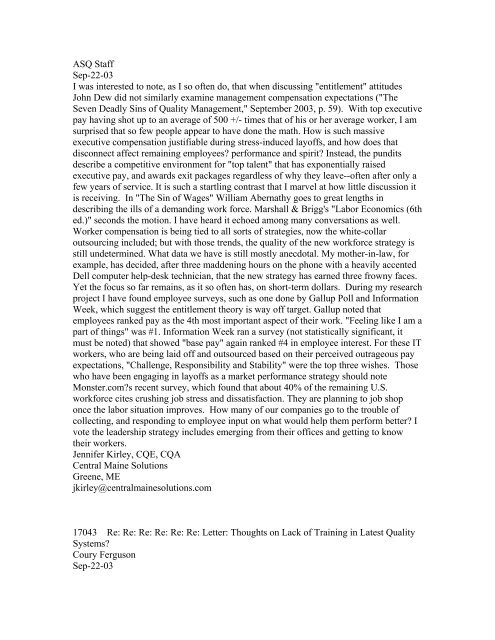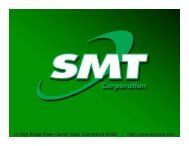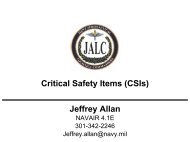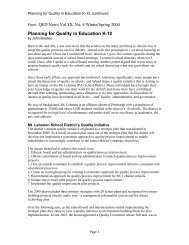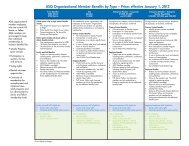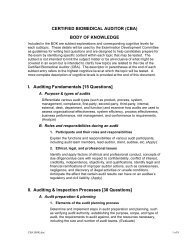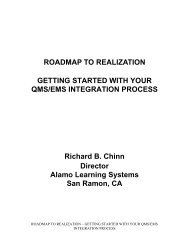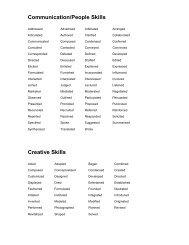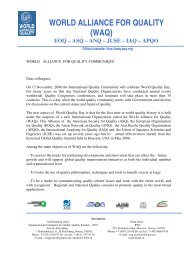Quality Progress - American Society for Quality
Quality Progress - American Society for Quality
Quality Progress - American Society for Quality
Create successful ePaper yourself
Turn your PDF publications into a flip-book with our unique Google optimized e-Paper software.
ASQ Staff<br />
Sep-22-03<br />
I was interested to note, as I so often do, that when discussing "entitlement" attitudes<br />
John Dew did not similarly examine management compensation expectations ("The<br />
Seven Deadly Sins of <strong>Quality</strong> Management," September 2003, p. 59). With top executive<br />
pay having shot up to an average of 500 +/- times that of his or her average worker, I am<br />
surprised that so few people appear to have done the math. How is such massive<br />
executive compensation justifiable during stress-induced layoffs, and how does that<br />
disconnect affect remaining employees? per<strong>for</strong>mance and spirit? Instead, the pundits<br />
describe a competitive environment <strong>for</strong> "top talent" that has exponentially raised<br />
executive pay, and awards exit packages regardless of why they leave--often after only a<br />
few years of service. It is such a startling contrast that I marvel at how little discussion it<br />
is receiving. In "The Sin of Wages" William Abernathy goes to great lengths in<br />
describing the ills of a demanding work <strong>for</strong>ce. Marshall & Brigg's "Labor Economics (6th<br />
ed.)" seconds the motion. I have heard it echoed among many conversations as well.<br />
Worker compensation is being tied to all sorts of strategies, now the white-collar<br />
outsourcing included; but with those trends, the quality of the new work<strong>for</strong>ce strategy is<br />
still undetermined. What data we have is still mostly anecdotal. My mother-in-law, <strong>for</strong><br />
example, has decided, after three maddening hours on the phone with a heavily accented<br />
Dell computer help-desk technician, that the new strategy has earned three frowny faces.<br />
Yet the focus so far remains, as it so often has, on short-term dollars. During my research<br />
project I have found employee surveys, such as one done by Gallup Poll and In<strong>for</strong>mation<br />
Week, which suggest the entitlement theory is way off target. Gallup noted that<br />
employees ranked pay as the 4th most important aspect of their work. "Feeling like I am a<br />
part of things" was #1. In<strong>for</strong>mation Week ran a survey (not statistically significant, it<br />
must be noted) that showed "base pay" again ranked #4 in employee interest. For these IT<br />
workers, who are being laid off and outsourced based on their perceived outrageous pay<br />
expectations, "Challenge, Responsibility and Stability" were the top three wishes. Those<br />
who have been engaging in layoffs as a market per<strong>for</strong>mance strategy should note<br />
Monster.com?s recent survey, which found that about 40% of the remaining U.S.<br />
work<strong>for</strong>ce cites crushing job stress and dissatisfaction. They are planning to job shop<br />
once the labor situation improves. How many of our companies go to the trouble of<br />
collecting, and responding to employee input on what would help them per<strong>for</strong>m better? I<br />
vote the leadership strategy includes emerging from their offices and getting to know<br />
their workers.<br />
Jennifer Kirley, CQE, CQA<br />
Central Maine Solutions<br />
Greene, ME<br />
jkirley@centralmainesolutions.com<br />
17043 Re: Re: Re: Re: Re: Re: Letter: Thoughts on Lack of Training in Latest <strong>Quality</strong><br />
Systems?<br />
Coury Ferguson<br />
Sep-22-03


